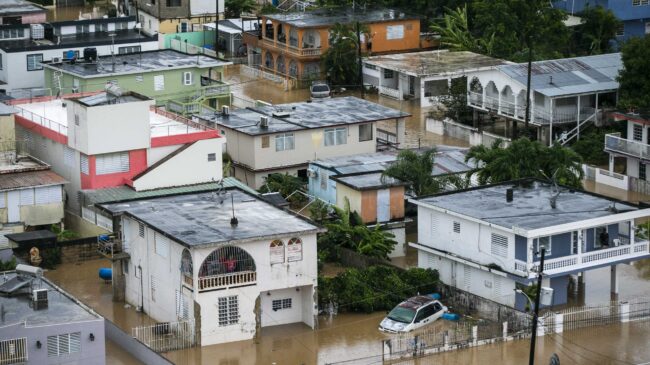Despite Hurricane Fiona’s devastation of Puerto Rico in mid-September, recovery efforts to help the United States island territory have been sluggish at best. A century-old law has hindered relief efforts from day one—the Merchant Marine Act of 1920, which is colloquially known as the Jones Act.
The Jones Act restricts all domestic shipping to U.S.-flagged, built, owned, and staffed vessels, making it harder for cheaper foreign vessels to transport goods around the United States, particularly to the remote states and territories of Hawaii, Alaska, and Puerto Rico. It also raises shipping costs by shielding domestic carriers from international competition.
The Biden administration waived the Jones Act for one ship carrying diesel fuel to Puerto Rico after Hurricane Fiona. This week, almost a month later, the Biden administration lifted Jones Act requirements for liquefied natural gas (LNG) imports to the island. This most recent waiver revealed exactly how the Jones Act hurts those it was intended to help. The U.S. Jones Act-compliant fleet has zero LNG carrier ships, so the Jones Act is currently working to protect an industry that doesn’t exist domestically while Puerto Ricans suffer as a direct result.
Previous presidential administrations have also waived the Jones Act in the aftermath of other natural disasters, including the Obama administration following Superstorm Sandy in 2012 and the Trump administration after Hurricanes Harvey and Irma in 2017. But the history of these waivers points to a troubling trend: Lacking voting power in Congress, Puerto Rico has no say in whether the Jones Act should be waived or repealed.
Despite widespread political divisions on other issues, namely statehood, “Puerto Rican politicians […] are in agreement that the Jones Act only harms Puerto Rico’s ability to import goods,” writes Carlos Edill Berríos Polanco.
Imports are critical to Puerto Rico. The island imports 85% of its food and all of its petroleum, the latter being critical to keeping grocery stores and hospitals operational after a hurricane like Fiona. In Puerto Rico, where 40.5% of the population lives in poverty, the cost of energy averages around 22.7 cents per kilowatt hour—7.2 cents more than the U.S. average—largely due to the high cost of importing petroleum.
The costs of importing goods from the mainland United States to Puerto Rico (on U.S. ships) are so high that the island has come to rely on international carriers for their lower transportation costs. As the Congressional Research Service (CRS) noted in 2017, “Puerto Rico and Hawaii now receive more cargo from foreign countries than they do from the U.S. mainland.”
Due in large part to the Jones Act, it is cheaper and easier for Puerto Rico to import goods directly from Europe or Columbia than the U.S., despite Puerto Rico being part of the United States.
The Jones Act’s worst impacts have been seen after recent natural disasters, but even during the best of times, this law hurts Puerto Ricans. A study by John Durham & Associates found that Puerto Rico paid $568.9 million more for shipping, and prices were $1.1 billion higher than they would be without the Jones Act. Paired with the projected job creation a free market for ocean freight would have provided, the study concludes that the Jones Act costs Puerto Rico nearly $1.5 billion a year.
More ships and carriers would increase competition and lower costs, helping alleviate these problems. But, the Jones Act has had the opposite effect on U.S. domestic shipbuilding capacity while also banning foreign competition. Figure 1 below shows that the domestic Jones Act fleet has been shrinking rapidly, from 434 ships in 1950 to 99 in 2018.
The domestic fleet’s size has recently started to stagnate, and shipbuilding capacity has suffered due to the Jones Act. U.S. shipbuilding costs are much higher, with American-built merchant marine vessels costing “4-5 times as much as those built abroad.” The CRS found that the oceangoing Jones Act–compliant fleet is almost entirely operating “in areas where shippers have little alternatives.” Thanks to the scarcity of compliant vessels, shipping costs have risen sharply while capacity has plummeted.
Colin Grabow, a research fellow at the Cato Institute, explains:
The Jones Act U.S.-build requirement has incentivized American shipyards to orient themselves away from the competitive international market and toward this captive domestic shipbuilding market. This, in turn, means reduced output, […], less competition, and the failure to develop a specialized market niche.
Repealing the Jones Act would have major benefits. A study by the Organization for Economic Co-Operation and Development (OECD) found that repealing the Jones Act would increase shipbuilding output and demand and produce “significant economic gains.”
The Jones Act is an expensive failure. The two Jones Act waivers issued by the Biden administration, while helpful at the moment, should not have been necessary in the first place. Long-term relief for Puerto Rico can best be secured through the wholesale repeal of the Jones Act.

